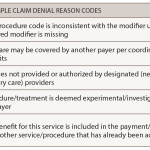 Rheumatology practices are working through new coding rules for evaluation and management (E/M) services implemented earlier this year and face ongoing coding and billing updates that can take effect with little notice. Meanwhile, the average health claim denial rate is up.1 Such hurdles can make medical practice management feel like an uphill battle.
Rheumatology practices are working through new coding rules for evaluation and management (E/M) services implemented earlier this year and face ongoing coding and billing updates that can take effect with little notice. Meanwhile, the average health claim denial rate is up.1 Such hurdles can make medical practice management feel like an uphill battle.

Ms. Chung
But you don’t have to go it alone, stress ACR Director of Practice Management Antanya A. Chung, CPC, CPC-I, CRHC, CCP, and ACR coding and reimbursement specialist Melesia Tillman, CPC-I, CPC, CRHC, CHA.
Ms. Chung and Ms. Tillman work full time to support members with practice questions on a range of topics, including patient documentation, audits, coding, Medicare, HIPAA, legal and compliance questions and marketing.
Resolving Denials
Coding and billing issues represent the most common questions that practice managers, billers and even physicians ask the ACR, and many of these questions seek answers to why a claim was denied. To help find answers, Ms. Tillman speaks directly with practice managers and takes a stepped approach to help them investigate a denied claim. She starts by finding out what service was provided, then reviews the medical policy to check for any frequency limitations and to make sure all services can be billed on the same claim.

Ms. Tillman
“Sometimes, a very simple coding error can result in a denial that can be corrected and resubmitted for payment,” Ms. Tillman explains. For example, she says, if a practice bills for an infusion and an IV push on the same visit, the practice cannot bill for two initial codes. Instead, the infusion is the initial code and the push would be a subsequent code.
Ms. Tillman also helps investigate the diagnosis by reviewing the policy to verify all the covered diagnoses, then sending the practice manager a copy of the policy to see if any of the diagnoses are on their claim.
In Chicago, rheumatology office manager Alice P. has worked with Ms. Chung and Ms. Tillman over the years on several administrative questions, including on-site support with the transition to ICD-10 and ongoing coding and billing issues. “When I see a denial, I don’t hesitate to pick up the phone and call Melesia [Tillman] because I know she has the answer I need or she will find it,” Alice P. says.
It’s not uncommon to receive a denial from an insurance company with no explanation as to why, and spending time trying to figure out the issue with the insurance company can send you in circles with no solution, she notes. “My relationship with the ACR over the years to seek out assistance with any new [administrative] issue that comes up has not only saved me time and sanity, it’s also saved our patients from having to wait to get the treatments they need for their chronic health conditions.”
Ms. Tillman says she appreciates working with practice managers like Alice P., who often bring new trends in denials to her attention so she can help others facing similar issues. She and Ms. Chung also take a proactive approach to alerting members when they hear of a change coming.
Recently, Ms. Tillman contacted Monica Archie, billing manager for Rattandeep Singh, MD, in Atlanta to alert her that an XS billing modifier was about to change. “I knew this change was coming, but I didn’t realize it had already changed. Getting the alert from the ACR saved me weeks trying to get an approval if I would have had to resubmit a corrected claim,” Ms. Archie explains.
To practice managers and billing specialists who aren’t connected with the ACR, Ms. Archie encourages taking any opportunity to seek out the expertise that Ms. Chung and Ms. Tillman offer. “You can always count on them for good advice. They are always ready to pick up the phone, email back or even meet in person with an answer to my coding and billing questions,” Ms. Archie says.
E/M Coding Changes in Practice
This year, Ms. Tillman and Ms. Chung have seen an uptick in questions from practice managers about how to accurately code the updated E/M services. One reason for these questions is the major changes to AMA CPT office and outpatient E/M codes that took effect in January 2021 to reduce administrative burden on providers and roll back some of the rigid requirements for E/M coding.
“While these changes were made to make coding easier, adapting to these changes has presented a learning curve for many,” Ms. Chung notes.
For example, providers are no longer subjected to the three key components of E/M for both new and established patients, but they can make their code selection based on the medical decision-making level or time spent on that date of service. If time is chosen, time must be documented specifically and include total time of care provided for that day. Additionally, time can now include both face-to-face and non-face-to-face time, such as reviewing a patient’s test results in preparation for their clinical visit, as long as the non-face-to-face time is provided on the date of service, Ms. Tillman explains. In addition, the history and examination component of E/M is no longer required for visits using codes 99202–99215; instead, each service should include “a medically appropriate history and/or examination” and be documented in the patient’s medical record, Ms. Chung adds.
Getting the Support You Need
Ms. Chung and Ms. Tillman encourage rheumatologists and practice managers to reach out to the ACR with questions. They also point to the ACR’s extensive collection of practice support resources, including guidance and FAQs for common administrative questions:
- Practice Publications, such as a manual on the business side of rheumatology;
- Coding resources, such as the Coding & Reimbursement Guidelines for Interprofessional Consultation Codes and how to select an E/M code based on medical decision-making or based on time;
- FAQs on E/M, infusion, inject and incident-to services; and
- Current issues on insurance advocacy.
Find more administrative support resources from the ACR and reach out to the ACR directly with a business practice question by sending an email to Ms. Tillman and Ms. Chung at [email protected].
Carina Stanton is a freelance science journalist based in Denver.
References
- The Change Healthcare 2020 Revenue Cycle Denials Index. American College of Healthcare Executives.

